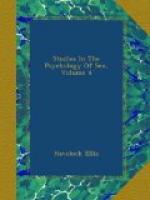We may observe this very well in the case of the dog. Thus, a young dog, well known to me, who had never had connection with a bitch, but was always in the society of its father, once met the latter directly after the elder dog had been with a bitch. He immediately endeavored to behave toward the elder dog, in spite of angry repulses, exactly as a dog behaves toward a bitch in heat. The messages received by the sense of smell were sufficiently urgent not only to set the sexual mechanism in action, but to overcome the experiences of a lifetime. There is an interesting chapter on the sense of smell in the mental life of the dog in Giessler’s Psychologie des Geruches, 1894, Chapter XI, Passy (in the appendix to his memoir on olfaction, L’Annee Psychologique, 1895) gives the result of some interesting experiments as to the effects of perfume on dogs; civet and castoreum were found to have the most powerfully exciting effect.
The influences of smell are equally omnipotent in the sexual life of many insects. Thus, Fere has found that in cockchafers sexual coupling failed to take place when the antennae, which are the organs of smell, were removed; he also found that males, after they had coupled with females, proved sexually attractive to other males (Comptes Rendus de la Societe de Biologie, May 21, 1898). Fere similarly found that, in a species of Bombyx, males after contact with females sometimes proved attractive to other males, although no abnormal relationships followed. (Soc. de Biol, July 30, 1898.)
With the advent of the higher apes, and especially of man, all this has been changed. The sense of smell, indeed, still persists universally and it is still also exceedingly delicate, though often neglected.[25] It is, moreover, a useful auxiliary in the exploration of the external world, for, in contrast to the very few sensations furnished to us by touch and by taste, we are acquainted with a vast number of smells, though the information they give us is frequently vague. An experienced perfumer, says Piesse, will have two hundred odors in his laboratory and can distinguish them all. To a sensitive nose nearly everything smells. Passy goes so far as to state that he has “never met with any object that is really inodorous when one pays attention to it, not even excepting glass,” and, though we can scarcely accept this statement absolutely,—especially in view of the careful experiments of Ayrton, which show that, contrary to a common belief, metals when perfectly clean and free from traces of contact with the skin or with salt solutions have no smell,—odor is still extremely widely diffused. This is especially the case in hot countries, and the experiments of the Cambridge Anthropological Expedition on the sense of smell of the Papuans were considerably impeded by the fact that at Torres Straits everything, even water, seemed to have a smell. Savages are often accused




